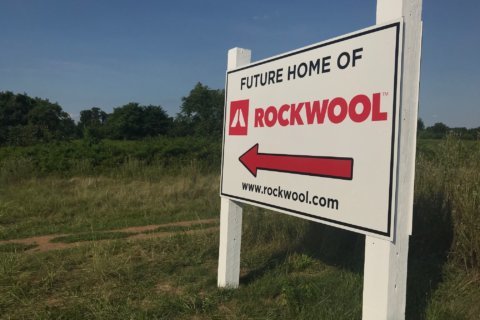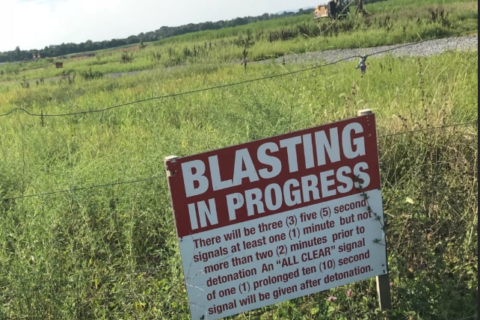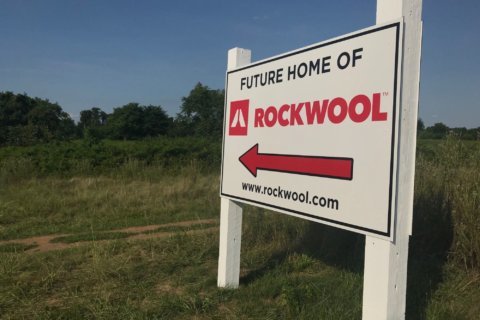WASHINGTON — Among the questions being debated as the Rockwool insulation factory is being built in Jefferson County, West Virginia, is: “Will the emissions make people sick?”
The Denmark-based company is building the factory on the site of a former apple orchard, off Route 9.
Rockwool melts basalt rocks into molten lava, which is spun into a cotton-candy-like fiber, used in home and business insulation.
Since ground was broken on the factory in July, thousands of people living nearby and antipollution activists have expressed concern, protested and filed legal actions to stop construction.
The lawsuit was filed in Jefferson County Circuit Court by Jefferson County Vision, a nonprofit formed out of Citizens Concerned Against Rockwool Ranson, WV, a Facebook group with more than 11,000 members.
While the lawsuit focuses on how the Rockwool deal was done, the underlying concern for many is how emissions from the 24-hour-a-day factory will affect the health of neighbors and the environment.
Loudoun County, Virginia, located 12 miles from the Rockwool site, is taking steps to ensure additional air quality monitoring stations are located in the western portions of the county, which is home to vineyards and other agritourism.
According to Rockwool’s Air Quality Permit Notice, which was filed the day before Thanksgiving 2017, the company estimates the factory will emit 239 tons of Nitrogen Oxides, 470 of Volatile Organic Compounds, 148 tons of Sulfur Dioxide, 134 tons of Particulate Matter less than 2.5 microns, and 153,000 tons of Carbon Dioxide.
However, Rockwool has maintained that its estimates are worst-case scenarios, and in all cases are far below allowable levels set by the Environmental Protection Agency.
In an August statement to WTOP, Rockwool president Trent Ogilvie vowed the factory’s presence would not jeopardize nearby residents’ health or the environment: “We believe there is an exceptionally robust body of scientific research and analysis that underpins the determination that the Rockwool factory in Ranson will have no negative consequences for the health and well-being for those in the community or further away.”
Opponents to the plant counter heavy industry is not compatible with Jefferson County, known in part of its natural beauty.
But the question has remained: Will children and sensitive people living near factories, and employees who work in the factories become ill.
No — at least they haven’t until now, according to Michael Zarin, vice president of group communications for Rockwool Group.
WTOP asked Zarin: “Has anyone — either a neighbor or an employee — ever filed suit against Rockwool, claiming they got sick because of the factory?”
In response to the question about occupational health and claims by people living near the company’s 45 manufacturing facilities on five continents, Zarin said the company has reviewed its internal data back to the early 2000s.
“We have never had an incident of occupationally-related cancer among our employees,” Zarin said. “We’re not saying that no Rockwool employee has ever experienced a cancer diagnosis, just not one that is show to have been occupationally-related.”
Zarin said there have been instances where an employee was either allergic, or became allergic to materials used in the factory, typically skin-related.
“It’s important to note with skin allergies that in some cases, they can be pre-existing even if dormant, and then triggered by environmental or other factors,” Zarin said. “Such instances would typically result in the employee moving to a different workplace internally.”
Zarin said there have been cases of employees experiencing muscle strain or pain from ergonomic issues, “as well as slight hearing restriction or breathing issues, which are dealt with as they arise by reorganizing the work, eliminating or reducing sources of the issue, improving equipment, or use of Personal Protective Equipment.”
Over the years, Zarin said “several employees have filed health related claims that resulted in Rockwool paying compensation even in cases that were not definitively linked to occupational issues.”
According to Zarin, Rockwool has never been sued by somebody claiming they became ill from pollution emitted by its insulation factories.
“To the best that I’ve been able to determine, we have not had any lawsuits filed by employees or neighbors related production facilities or products,” he said.








